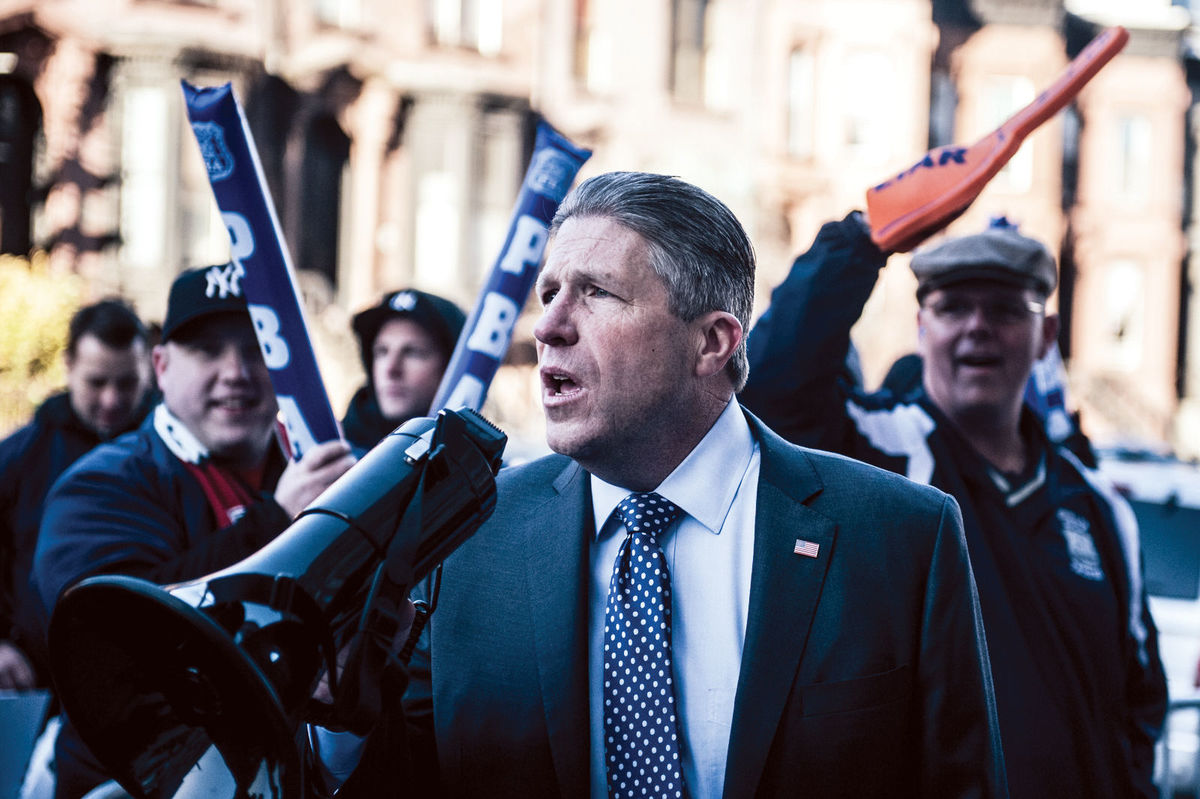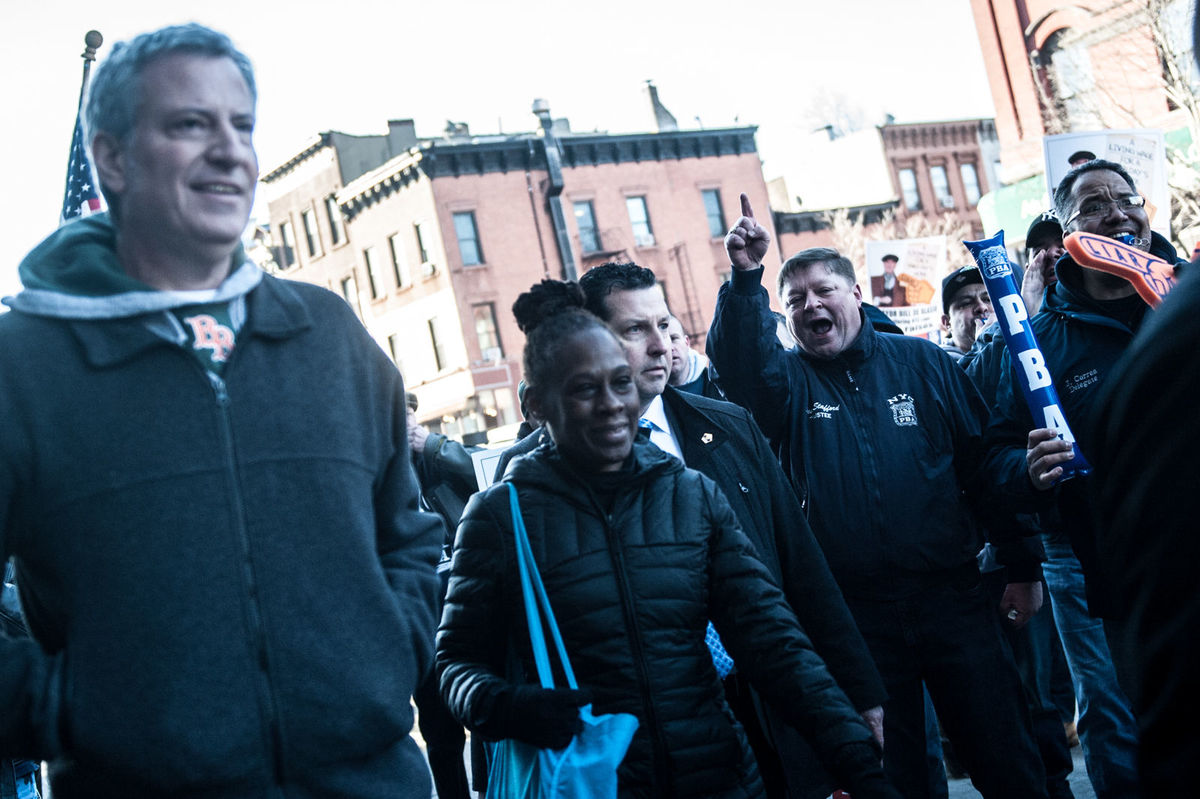





MAYOR’S CONSTANT COMPANIONS: Patrolmen’s Benevolent Association President Pat Lynch goes to the bullhorn to promise that the union will dog Mayor de Blasio until he negotiates fairly on a new contract, declaring, ‘We went to Iowa. We’re out here in Park Slope. We’ll be in Manhattan.’ (The Chif-Leader/Rebecca White)
A week after the Patrolmen’s Benevolent Association followed Mayor de Blasio to his Park Slope gym to accuse him of being “no friend of labor” while announcing it was filing for binding arbitration in its stalled contract talks, the city’s chief negotiator returned serve by filing a charge that the union had violated the Taylor Law “by failing to negotiate in good faith.”
Labor Commissioner Robert W. Linn said April 2 that he was asking the state Public Employment Relations Board to reject the PBA’s bid for arbitration and instead order both sides “back to the place where this contract should be settled—at the bargaining table.”
A Familiar Acrimony
Although the rhetorical pitch was higher than usual on both sides, the choreography had a distinct familiarity. Four of the previous six PBA contracts have been decided in arbitration; for the 2002 one, which was Mr. Lynch’s first as union president, Mr. Linn actually served as the union’s outside labor counsel.
They parted company following that arbitration award, and over the first 51 months of the de Blasio administration, acrimony has run high. Even after the one accord reached without help of a third party, in January 2017, brief moments of good feeling quickly dissolved after other uniformed unions complained about the terms. Mr. Lynch responded that their gripes were proof that they had colluded with the city to thwart his efforts to bring pay for his members significantly closer to what was earned by cops in neighboring jurisdictions whose jobs were often less dangerous and demanding.
While salary has almost always been the overriding issue triggering disputes between the PBA and the past four mayoral administrations, the city’s demand for health-benefit savings and other fringe-benefit economies as part of the deal took on increased prominence this time.
 GETTING THEIR MONEY’S WORTH: Police Officers angered by a city wage offer their union claims is not only inadequate but would be canceled out by givebacks being demanded by Mayor de Blasio, give him and First Lady Chirlane McCray an up-close piece of their minds on the streets of Park Slope March 26. (The Chief-Leader/Rebecca White)
GETTING THEIR MONEY’S WORTH: Police Officers angered by a city wage offer their union claims is not only inadequate but would be canceled out by givebacks being demanded by Mayor de Blasio, give him and First Lady Chirlane McCray an up-close piece of their minds on the streets of Park Slope March 26. (The Chief-Leader/Rebecca White)
A press release issued by the union prior to its March 26 appearance outside both the neighborhood patisserie and the Park Slope YMCA, which are parts of Mr. de Blasio’s morning routine before arriving at City Hall, detailed what it called the city’s “inflexibility” in those areas, which it said would drain the value of wage hikes of 3.25 percent that the administration was offering over a two-year period.
Angered by Deductibles
The PBA had not been happy about health-benefit savings in the last round of bargaining that officials at other unions described as relatively painless, given the $3.4-billion savings target that the city was actually able to meet ahead of schedule. It was even unhappier about the proposal this time, and got some support in its claim that the city was asking too much from Harry Nespoli, the president of the Uniformed Sanitationmen’s Association, who as chairman of the Municipal Labor Committee presides over the union arm that negotiates changes in health coverage.
The union’s release stated that the city was seeking new medical deductibles from its members and trying to force them to use municipal hospitals and their affiliated doctors rather than private ones and the physicians who were connected to those facilities by raising non-municipal-hospital in-patient co-payments from $300 to $3,000 and outside primary-care doctor and specialist co-payments from $15 to $40.
In addition, the PBA said, the city had demanded that its contributions to the union’s health and welfare funds be reduced by 57 percent, and that the union’s annuity fund be eliminated.
Mr. Linn in an interview declined to discuss the demands as described by the union, saying he would stick to his four-decade-old practice of not negotiating in the media. But he said that rather than simply prepare for another arbitration battle with the PBA, he had asked PERB to find the union guilty of bad-faith bargaining because of its refusal to engage in the give-and-take that is at the heart of collective bargaining.
‘Where’s Counter-Proposal?’
Addressing the health-benefits issues in general, he said, “The concern that we have is that we made an initial health proposal to the MLC and the PBA said it would not be bound by that.” And, he added, in a separate discussion as part of the contract talks with the union, “they refused to respond to our proposal” on health care. “We made a proposal and got zero counter-proposal from them.”
As a result, he characterized the PBA’s approach as “the opposite of negotiating in good faith; it is not even ‘negotiating’ at all. The law is clear that interest arbitration is not a substitute for real negotiations, but instead of fulfilling its legal obligation to negotiate in good faith, the PBA seeks to skip past the bargaining process and rush to interest arbitration.”
Mr. Lynch responded, "Once again, the city is dragging its feet to avoid a contract settlement with the PBA. We initiated the bargaining process nearly a year ago and have been waiting for the city to come to the table with a realistic offer since then. It took more than 6 months for the city to make any wage proposal at all, and even then they offered New York City Police Officers three-and-a-half years with effectively zero raise.
 "Since the city is apparently unwilling to have serious negotiations with the PBA, it should get out of the way and let the impasse resolution process work as intended."
"Since the city is apparently unwilling to have serious negotiations with the PBA, it should get out of the way and let the impasse resolution process work as intended."
The January 2017 contract covered a five-year period, much of which had already elapsed, and so it ran only through last July. Two weeks after its expiration, the PBA filed for arbitration, starting a process that under PERB’s rules requires mediation as an intermediate step.
In mid-October, the de Blasio administration offered raises totaling 4.25 percent over a 42-month period, which the union responded would have been inadequate even if the city hadn’t been seeking concessions in other areas that it contended would reduce the hikes to “net-zero.”
Shortly after Thanksgiving, PERB ordered mediation; one source familiar with the process said the city’s health-benefit demand had stymied meaningful discussions with a union that begins every bargaining round with the determination to do better than other city unions as part of its quest to approach parity with Police Officer salaries in neighboring departments.
Giving Him an Earful
During the sometimes-raucous March 26 rally, PBA officials tracked the Mayor and his wife, Chirlane McCray, as they made the trek from the bakery where he generally has a croissant to the Park Slope Y, with Mr. de Blasio’s NYPD security detail providing a buffer that could not turn down the noise made by the protesters.
According to an account in the New York Post, Mr. Lynch at one point declared, “He is no friend of labor and we will follow him until he negotiates. We went to Iowa. We’re out here in Park Slope. We’ll be in Manhattan.”
Mr. Linn, who was just returning from a vacation on the day of the protest, seven days later more quietly accused the union of being the party that was unwilling to hash out the differences in the two sides’ positions.
Should PERB ultimately decide that a bargaining impasse has been reached, that would pave the way for the selection of a tripartite panel. Both the PBA and the city would designate one representative, and those two would have to agree on a third, neutral arbitrator, who would serve as the panel’s chairman. The contract award, which would be limited to two years unless both sides consented to a longer deal, would need the approval of at least two members of the panel.
Unhappy Ending in '15
In November 2015, arbitration-panel chairman Howard Edelman issued an award limiting the union to two 1-percent annual raises that matched what a coalition of uniformed unions had negotiated 11 months earlier for the first two years of a seven-year pact with raises totaling 11 percent. The union was so angered by his decision to honor the existing uniformed-union pattern that when the award was still in preliminary form, Mr. Lynch organized a protest on Halloween outside Mr. Edelman’s Upper East Side apartment, and after it was finalized, refused to pay the final portion of its share of his fee until he initiated court action.
Mr. Nespoli during a March 27 phone interview said of the health-benefits talks, “This is definitely gonna be more difficult” than in the initial round of bargaining with the de Blasio administration, when a health-savings plan was reached four months into the Mayor’s tenure. Mr. Linn’s willingness to be flexible on where the savings came from, and to not require givebacks to be a prime element of a deal, were helpful in setting a tone, but the MLC chairman said another factor was the willingness of the new administration to negotiate after Michael Bloomberg, in his last of three terms as Mayor, adopted a stance that required the unions to offer givebacks equal to any raises they hoped to gain.
That led to settlements with Mr. de Blasio that left many union leaders unhappy regarding the raises, but important advances in fringe-benefit areas persuaded them to sign off on deals that didn’t keep pace with inflation. This time, Mr. Nespoli said, with the administration having cleared the decks of a huge back-pay obligation with unions, led by the United Federation of Teachers, that Mr. Bloomberg had left two 4-percent raises behind much of the municipal labor movement, hopes had been higher.
Cites Giveback-Free Pacts
While the prospect of cuts in Federal aid to the city has dampened those hopes somewhat, Mr. Nespoli said, “I don’t know where it’s stated that when it’s contract time, we have to pay for our own raise.”
He said regarding the 2014 health-care deal, which the PBA vigorously protested at the time, “We’ve accomplished a lot. But this round is a little different, and unions are settling across the country without any givebacks.”
Unless the city moves off its current demands that would hit union members far harder in their pockets than the initial deal did, he said, “I don’t know if we’re gonna reach an agreement” when the existing accord expires July 1. “This is unknown waters that we’re going into.”
Asked about the PBA moving this early for binding arbitration, Mr. Nespoli said, “It doesn’t surprise me at all. The city’s taking a hard stand right now, and I think they’re expecting too much.”
Told of those comments, Mr. Linn chose to echo the positive ones from the MLC leader, saying, “I would agree that we’ve accomplished a lot in health the last four years, and I expect labor and management will accomplish a lot more in the years to come.”